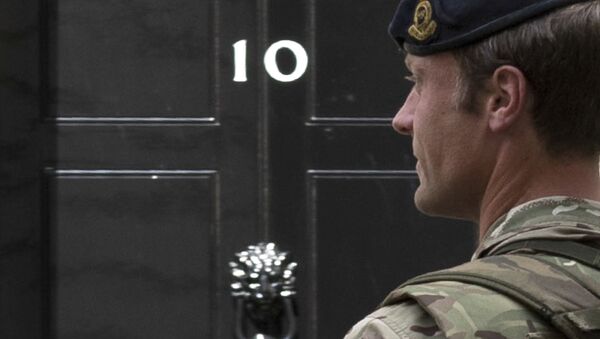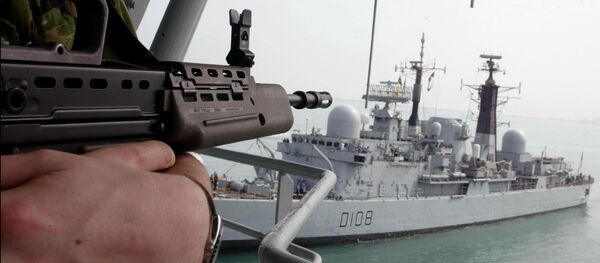The latest figures show there are 82,480 full-time soldiers in the army but only 78,150 are fully trained — in 2014, troop numbers stood at 87,180, and two years earlier over 100,000. The number of fully trained Royal Navy/Royal Marines personnel stands at 29,430 (a 1,020 shortfall from the government's target), and the RAF is around 1,000 below the government's target of 31,750.
Stewart, himself a former British Army officer and UN commander in Bosnia, said current numbers were "laughable."
"Clearly our armed forces are much smaller than they've been in the past. I think it's disgraceful. We haven't got enough troops. It's smaller than our armed forces and our army has been since the 17th century. Of course I want two percent of GDP spent, but actually I want more than that. I want what we need to spend on defense sorted out and we should do all our reviews by looking at what we need, not against some kind of figure," he explained.
Elsewhere in the event, Stewart's fellow Conservative MPs, Leo Docherty and Jack Lopresti, supported his suggestion that the NATO target should be exceeded.
"Mass does matter and it will continue to matter. I'm an advocate and I will always be an advocate for bigger armed forces. In an ideal world, I would like to see somewhere nearer three percent [spent on defense]," said Docherty.
Noting specialist Royal Navy officers are being transferred between different ships due to their short supply, Labour Shadow Defense Minister Wayne David said the UK military was "woefully" under strength, and rumors were rife that there could well be further cuts in the future.
In response, Defense Minister Harriett Baldwin emphasized the government was committed to increasing the UK military budget every year until 2022 (the nominal end of this parliament), spending included a 0.5 percent link above inflation, and the UK remained the fifth largest spender in the world.
That the UK remains the world's fifth largest military spender despite the comparatively diminutive size of the country's armed forces (152,350 in total) seems puzzling. The rest of the world's top 10 defense spenders all maintain much larger reserves; US 1,347,000; China 2,183,000; Saudi Arabia 227,000; Russia 831,000; India 1,395,100; France 202,950; South Korea 630,000; Japan 247,150; Germany 176,800.
One explanation could be Purchasing Power Parity — in some countries, the cost of technology, manpower and the like is much cheaper than the UK. The vast majority of military budgets in any country goes on salaries, social security, benefit, training and supplies, with only a fraction actually spent on military equipment and hardware. One dollar spent in countries such as China, India or South Korea buys a lot more than it would in the UK — perhaps as much as ten times more.
For example, India's Mars Orbiter Mission cost a comparatively trifling US$75 million — the same mission conducted by NASA would cost at least US$400 million.
2017 Year of Records: Golden Era in India's Space Technology#ISRO pic.twitter.com/jJk0Ue4EnI
— Dr Jitendra Singh (@DrJitendraSingh) July 19, 2017
However, the issue may go deeper than mere PPP. The UK has a predilection for spending big on high tech military equipment — Defense Minister Baldwin herself noted at the Westminster Hall debate that the government planned to spend around US$250 billion on new kit by 2026.
It's arguable though this dedication to big ticket cash splashing may be wrongheaded.
Given the planes are crucial if the UK is to launch its Queen Elizabeth-class aircraft carriers before their 2017 deadline, it may be the government is prepared to overlook budgetary and technological issues to ensure the pair is seafaring by the stated deadline, despite the risks of failure.
Similarly, around six percent of the UK's US$45 billion annual defense budget is earmarked for upgrading the Trident nuclear weapons system — an "independent" nuclear deterrent that the UK government has itself conceded is not independent, and is largely retained to allow the UK to maintain the "facade" of being a global military power.
The only circumstances in which the UK is ever likely to use the weapon, according to official reports, is to give "legitimacy" in a US nuclear attack by participating in it — akin to the UK's role in the US' foreign adventurism since World War Two.
The UK government may do well to rethink its hi-tech cravings. A July Royal United Services Institute report found the country's defense equipment capabilities are extremely vulnerable to low-cost, tech employed by other states.
New @RUSI_org report: Defence #Innovation & the UK: Responding to the Risks Identified by the US 3rd Offset Strategy https://t.co/JpmL8vfEu8
— RUSI (@RUSI_org) July 11, 2017
As a result, the institute suggested the UK should commit to research, innovation and adaptive technologies for genuine defense, rather than force projection.




